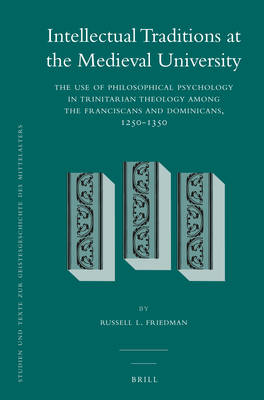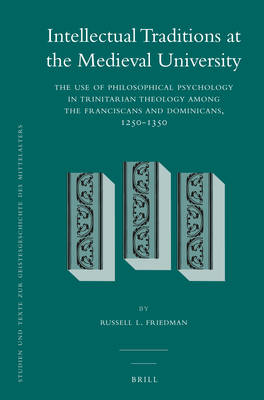
- Afhalen na 1 uur in een winkel met voorraad
- Gratis thuislevering in België vanaf € 30
- Ruim aanbod met 7 miljoen producten
- Afhalen na 1 uur in een winkel met voorraad
- Gratis thuislevering in België vanaf € 30
- Ruim aanbod met 7 miljoen producten
Zoeken
Intellectual Traditions at the Medieval University (2 Vol. Set)
The Use of Philosophical Psychology in Trinitarian Theology Among the Franciscans and Dominicans, 1250-1350
Russell Friedman
€ 557,45
+ 1114 punten
Omschrijving
This book traces the rise and decline of two rival intellectual traditions in later-medieval trinitarian theology, one of them predominantly Franciscan, the other predominantly Dominican. Disagreeing about the way to understand the identification in John's Gospel of the second person of the Trinity, the Son, with the Word, the two traditions clashed over the issues of concepts and concept formation, the category of relation, counterfactual logic, and the use of authority. Considering more than seventy theologians from the period, the book presents an overview of the debate, while also including detailed studies of the trinitarian views of such thinkers as Thomas Aquinas, Henry of Ghent, John Duns Scotus, Peter Auriol, William Ockham, Walter Chatton, and Gregory of Rimini.
Specificaties
Betrokkenen
- Auteur(s):
- Uitgeverij:
Inhoud
- Aantal bladzijden:
- 1216
- Taal:
- Engels
- Reeks:
- Reeksnummer:
- nr. 108
Eigenschappen
- Productcode (EAN):
- 9789004229853
- Verschijningsdatum:
- 12/10/2012
- Uitvoering:
- Hardcover
- Formaat:
- Genaaid
- Afmetingen:
- 155 mm x 235 mm
- Gewicht:
- 1817 g

Alleen bij Standaard Boekhandel
+ 1114 punten op je klantenkaart van Standaard Boekhandel
Beoordelingen
We publiceren alleen reviews die voldoen aan de voorwaarden voor reviews. Bekijk onze voorwaarden voor reviews.








